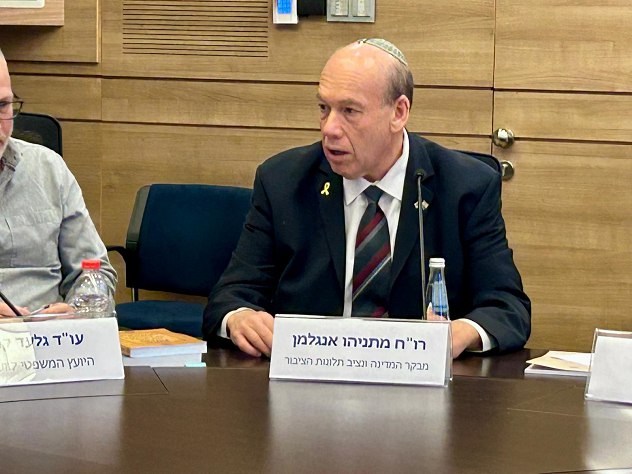Israeli law grants the State Comptroller extensive powers and exceptional independence compared to state comptrollers of other advanced states
The State Comptroller conducts external audits over the various activities of government ministries, local government and various public bodies that it is entitled to audit by virtue of the basic law: State Comptroller. The audit is aimed to guarantee that the auditees act in accordance with the law, proper management and integrity - and adhere to principles of efficiency.
State audit is a process which has different status, goals and methods compared to other forms of public audit. It is a process of independent review of the actions taken by the state, the state's institutes and corporations. In the course of the audit, the State Comptroller reviews all or some of the following aspects:
Legality & Regularity
Whether the actions taken by the auditees, such as implementing their powers, spending public funds and protecting human rights, are taken in accordance with the law, court rulings and appropriate norms. In fields that lack regulation based on laws, written procedures and legislation, the State Comptroller shall determine the appropriate norm. Often, in the course of time, these norms are granted a binding status in procedures and laws.
Savings, Efficiency & Effectiveness
Have the auditees acted in accordance with the following principles:
- Savings: were the resources required for the examined action obtained on time, in accordance with the necessary quantity and quality and at the best price?
- Efficiency: does the auditee make the most of - in terms of quality and quantity - the existing resources?
- Effectiveness: to what extent were the objectives of the plan or policy met? were they met as a result of policy implementation?
Integrity
Have the public servants worked in accordance with the principles expected from officials who fulfill public roles such as: avoiding conflict of interests, exercising reasonable judgement, avoiding bias and foreign considerations.
The Scope and Independence of the Audit
The scope of state audit in Israel is broad compared to other state audit institutions in the world.
The audit applies to all government ministries, state institutes, all branches of the defense establishment (the Ministry of Defense, IDF, military industries and even the most classified units) and all local authorities (read more on the Auditees).
In order for the State Comptroller to be able to fulfill his role, the basic law states that a body audited by the State Comptroller must provide to the Comptroller, without delay, at his demand, with information, documents, explanations, and any other material that in the opinion of the Comptroller are needed for the audit. When there is concern over violation of basic rights, and in particular, violation of the right to privacy, the sighting of the information shall be carried out in a restrained, reasonable and proportional manner.
The Principles of State Audit
The State Audit is -
- Independent and objective.
- Carried out in accordance with the law, with integrity, transparency, and in line with principles of good governance.
- Professional, striving for excellence and continuous improvement.
- Operates with a systemic approach to identify deficiencies and gaps, and to find root causes and main barriers.
- Contributes to national goals, strategic risks, social aspects, and environmental changes.
- Reflects the "full picture" fairly and accurately.
- Conducted with effective communication with the auditees.
- Effective, adding value, and providing insights with a forward-looking perspective.
- Increases accountability.
- Encourages the auditees to rectify deficiencies
Additional Roles of the State Comptroller
In addition to these auditing roles, additional roles were assigned to the State Comptroller over the years:
Audit of Parties and Political Candidates:
in accordance with the Party Financing Law, the State Comptroller examines how the factions and parties at the Knesset manage their finances on an ongoing basis and during election campaigns.
By virtue of the Local Authorities Act (election financing), the State Comptroller looks into the finances of the factions and electoral lists participating in the municipal election.
The Parties Law granted the State Comptroller the power to examine the accounts of candidates contesting for primaries, the elections to the Knesset and municipal election. It is done in order to ensure that the candidates have equal opportunities and that they are not dependent on donors with interests.
Reviewing Ministers and Deputy Ministers' Declarations of Capital in accordance with the Rules:
in accordance with the Rules for the Prevention of Conflicts of Interests set by the government in 1977, the ministers and deputy ministers must submit to the State Comptroller, upon taking office, - and once a year every year - a report specifying their and their family members' capital, assets, rights, revenues and liabilities as well as additional roles they fulfill. The rules impose obligations and restrictions on them regarding these matters and the State Comptroller must examine whether they comply with them.
Ombudsman:
By virtue of the basic law: State Comptroller, the State Comptroller serves as the Ombudsman as well. In this capacity, he serves as the official who handles complaints made by individuals who were negatively affected by actions taken by state and public bodies as prescribed by law. (Click and find out how the office of the Ombudsman functions and how it may assist you).
Audit on the Ombudsman of State Representatives in the Courts:
The State Representatives in the Courts are attorneys who appear, on behalf of the state, in courts and other judicial instances such as, the State Attorney's Office and police or municipal prosecutors.
The State Comptroller examines the management and efficiency of the entire unit. However, a complaint against a specific representative are handled by the Ombudsman of the State Representatives in the Courts under the Ministry of Justice.













